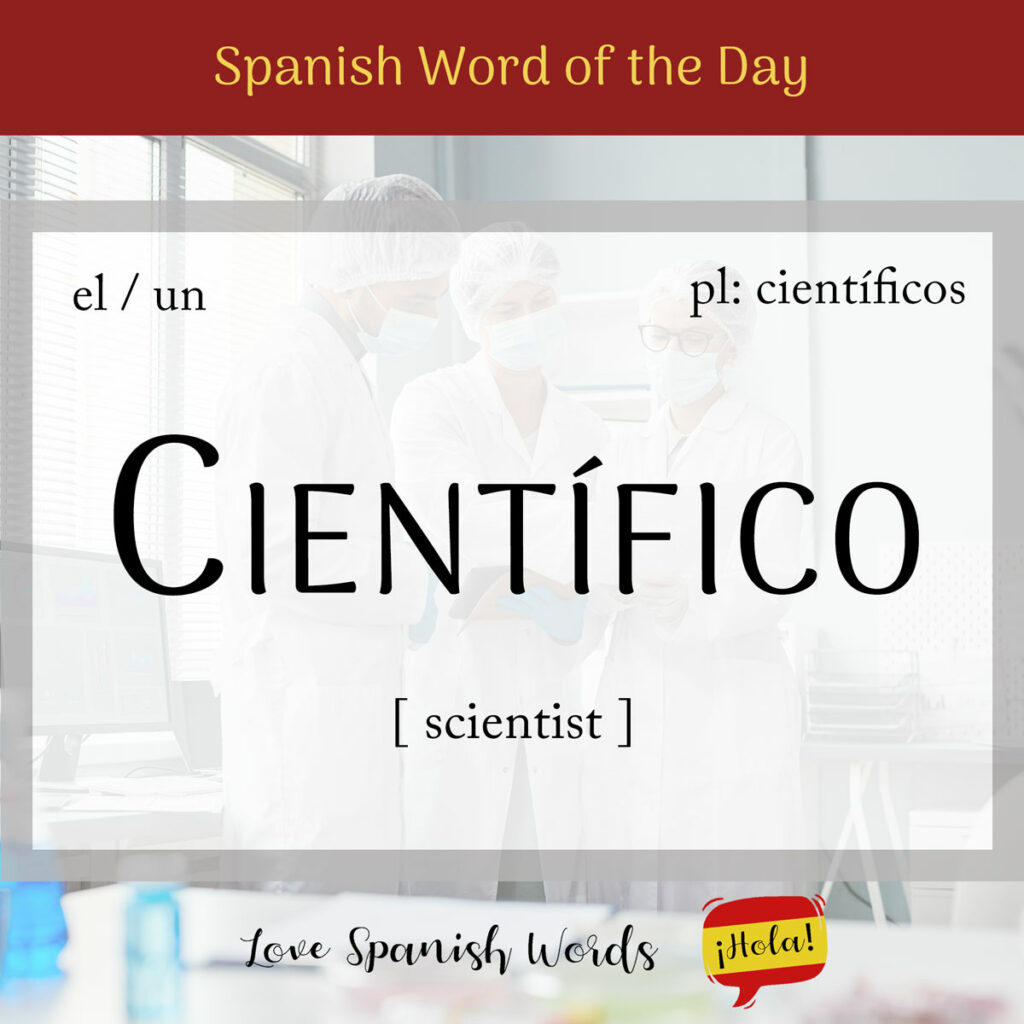The word científico comes from the Latin word scientifucus, which means to produce knowledge. In English, científico translates to scientist. It refers to a person who dedicates themselves to science or scientific investigation.
Latin American Pronunciation
European Pronunciation

Científico can be a feminine and masculine noun. It takes on the following definite and indefinite forms:
- el científico / la científica = the scientist
- los científicos / las científicas = the scientists
- un científico / una científica = a scientist
- unos científicos / unas científicas = some scientists
La científica investigó la medicina para la diabetes.
The scientist researched medicine for diabetes.
Científicos specialise in diverse areas. Below are a few areas of science or ciencias in which they specialise.
- ciencias de la tierra = Earth sciences
- ciencia biológica = biological science
- ciencias de la computación = computer science
- ciencias sociales = social sciences
- ciencias naturales = natural sciences
- ciencias ambientales = environmental sciences
- ciencias fisicas = physical sciences
Científicos play a crucial role in society because they help in the desarrollo (advancement) of technologies that improve la calidad de vida (quality of life).
Their job is important because they improve la salud pública (public health) and problemas ambientales (environmental problems). Some areas in which científicos work can lead to important descubrimientos (discoveries) and can improve problemas sociales (social problems).

Científicos famosos:
- Albert Einstein: Best known for his teoría de la relatividad (theory of relativity) and the ecuación (equation) E=mc^2
- Isaac Newton: Best known for formulating la ley del movimiento (law of motion) and his contributions to cálculo (calculus).
- Marie Curie: Best known for her investigación innovadora en radiactividad (groundbreaking research on radioactivity) and the first person to win Premios Nobel (Nobel Prizes) in two sciences.
- Charles Darwin: Best known for proposing la teoría de la evolución (the theory of evolution).
- Galileo Galilei: Best known for his work in astronomía (astronomy), movimiento (motion), and the método científico (scientific method).
To be a científico, certain characteristics are important. You must be curioso (curious) and observante (observant). You must also be able to colaborar (collaborate) and comunicar (communicate).
Furthermore, you must have an objetivo (objective) and use the método científico (scientific method). This includes forming a hipótesis (hypothesis) and realizando experimentos (conducting experiments).
El científico se especializa en ciencias ambientales.
The scientist specialises in environmental sciences.
The word científico can also be used as an adjective. The English translation is scientific. It’s used when referring to the scientific method or a scientific experiment. Let’s look below to see how the word can be used.
A common phrase using the word científico is científicamente comprobado (scientifically proven). It means that something has credibility because it has been checked by a científico using the método científico (scientific method). Here, científicamente is used as an adverb to describe how something was proven.
Método científico (scientific method) is generally used in science. However, sometimes it’s used colloquially to refer to a structured or systematic form of doing something. Here, científico is used as an adjective to describe a method.
Experimento científico (scientific experiment) is also used in science for experiments, but sometimes it is used in a colloquial way, referring to any type of test to see if something works. Here, científico is also used as an adjective to describe the experiment.
La comunidad científica está preocupada por el calentamiento global.
The scientific community is concerned about global warming.

Spanish colloquial and idiomatic expressions featuring ‘científico’
No es ciencia de cohetes means It’s not rocket science. Although it doesn’t use the word científico, this phrase is closely related to the idea of ciencia (science). It’s used to refer to something that is not difficult.
Ser un científico en lo suyo
Literal translation: to be a scientist in yours (in your field)
English meaning: to be extremely detailed, meticulous, and careful; to follow a specific method for evidence in order to complete something (even if it’s not science-based), to be particular and a perfectionist
Hacer algo con rigor de científico
Literal translation: to do something with the rigour of a scientist
English meaning: to conduct a project in a detailed and careful manner by following a precise method, to do something with perfectionism

